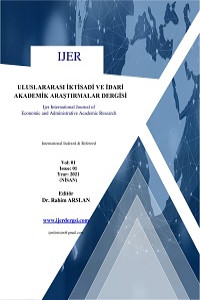Öz
Dünya ekonomik sisteminde birçok önemli ülke ve birlik vardır. Bunlardan birisi de Avrupa Birliğidir. Avrupa Birliği, Dünya ekonomik sisteminde en etkili ve stratejik bölgesel örgüttür. Birlik bünyesinde birçok önemli ekonomik yapı ve grup bulunmaktadır. AB, bu yapısını daha da geliştirmek ve genişletmek istemektedir. Dünya ekonomik sistemindeki bir diğer önemli aktör ise Japonya’dır. Japonya geçmiş yüzyılda en önemli askeri ve politik güçlerden biri konumundaydı. 2. Dünya Savaşında atom bombası felaketinden sonra dağıldı ve ABD’nin ekonomik ve politik yönetimini kabul etmek zorunda kaldı. Bu kötü koşullardan sonra, Japonlar çok çalışarak ekonomilerini tekrar güçlü konuma getirdiler. Japonya günümüzde en stratejik ve güçlü ülkelerden biridir.
Anahtar Kelimeler
Ahtapot Avrupa Birliği Japonya Meiji Restorasyonu Stratejik İşbirliği Antlaşması
Kaynakça
- Bacon, P. ve Kato, E. (2013). Potential Still Untapped: Japanese Perceptions of the European Union as an Economic and Normative Power. Baltic Journal of European Studies, 3(15), 59-84.
- Berkofsky, A (2014). The European Union (EU) in Asian Security: Actor with a Punch or Distant Bystander?, Asia-Pacific Review, 21 (2), 61-85, DOI: 10.1080/13439006.2014.978985
- Borucińska, I. (2018). The European Unıon And Japan Towards Strategıc Partnershıp Agreement And Economıc Partnershıp Agreement. Regional Formation and Development Studies, 2(25), 14-23, DOI: http://dx.doi.org/10.15181/rfds.v25i2.1741.
- Bossong, R. (2017). EU-Japan / Fight against Terrorism and Organized Crime. EU-Japan Security Cooperation, 1-12.
- Ferbermayr, G., Kimura, F., Okubo, T. ve Steininger, M. (2018). Quantifying The EU-Japan Economic Partnership Agreement. Center For Economic Studies And Ifo Institute, 7241, ISSN 2364‐1428 (Electronic Version) Frankel, M. ve Walter, B. (2017). The EU-Japan Economic Partnership Agreement: Relevance, Content and Policy Implications. Intereconomics, 358-363, DOI: 10.1007/s10272-017-0704-5.
- Gilpin, R. (1971). The Politics of Transnational Economic Relations. International Organization, 25, 398-419 doi:10.1017/S0020818300026229.
- Gilson, J.(2000). Japan and the European Union: a partnership for the twenty-first century? Basingstoke: Macmillan.
- Gilson, J. (2016): The Strategic Partnership Agreement between the EU and Japan: the pitfalls of path dependency?, Journal of European Integration, DOI: 10.1080/07036337.2016.1176027.
- Hilpert, H. (2017). The Japan-Eu Economic Partnership Agreement: Economic Potentials And Policy Perspectives. Stiftung Wissenschaft Und Politik, 49, 1-8.
- Hosoi, Y. (2019). Japan-EU relations after World War II and strategic partnership. Asia Europe Journal, 17, 295–307
- Kettunen, E. ve Alvstam, C.(2020). The EU-Japan Economic Partnership Agreement as a Norm Model for Sustainable Development Issues in the Future EU FTAs in Asia., Bernadette Andreosso-O’Callaghan, Sam Dzever, Jacques Jaussaud and Robert Taylor(Ed), Sustainable Development and Energy Transition in Europe and Asia(93-110), New York:Wiley
- Mazur, G.(2017). European Union – East Asia Trade Relations in the 21st Century. Review of Integrative Business and Economics Research,7(2), 32-61
- Nakashi, Y.(2019). The Economıc Partnershıp Agreement And The Strategıc Partnershıp Agreement Between The European Unıon And Japan From A Legal Perspectıve. Hitotsubashi Journal of Law and Politics, 47, 1-15
- Nelson, P. (2012) The Lisbon Treaty effect: toward a new EU-Japan economic and trade partnership?. Japan Forum, 24:3, 339-368, DOI: 10.1080/09555803.2012.699456
- Nuttall, S. (1996) Japan and the European Union: Reluctant partners. Survival: Global Politics and Strategy, 38(2)re, 104-120, DOI: 10.1080/00396339608442848
- Parado, C.(2017). Towards a Substantial EU-Japan Partnership. European Foreign Affairs Review, 22(4), 435–454.
- Policy Department for External Relations (2018). The EU-Japan Economic Partneship Agreement. 1-59, Erişim:22.04.2020 https://ec.europa.eu/trade/policy/in-focus/eu-japan-economic-partnership-agreement/
- Reiterer, M. (2006). Japan and the European Union: shared foreign policy interests. Springer, 333-349, DOI 10.1007/s10308-006-0075-1
- Sarah, T. (2016) The European Union and Japan: A New Chapter in Civilian Power Cooperation?. The Round Table, 105:1, 99-100, DOI: 10.1080/00358533.2015.1112638
- Schraeder,P., Hook, S. ve Taylor, B. (1998). Clarifying the Foreign Aid Puzzle: A Comparison of American, Japanese, French, and Swedish Aid Flows. World Politics, 50, 294-323 doi:10.1017/ S0043887100008121.
- Söderberg, M. (2012) Introduction: where is the EU–Japan relationship heading?, Japan Forum, 24:3, 249-263, DOI: 10.1080/09555803.2012.699452
- Suzuki, H. (2017) The new politics of trade: EU-Japan. Journal of European Integration, 39(7), 875-889, DOI: 10.1080/07036337.2017.1371709
- Takashi, J. ve Jain, P.(2000). Japanese Foreign Policy Today. New York: PALGRAVE
- Tsuruoka, M. (2019). The European Union as Seen by Japan in an Age of Uncertainty. Shaping the EU Global Strategy, The European Union in International Affairs, N. Chaban and M. Holland (eds.), 127-146, https://doi.org/10.1007/978-3-319-92840-1_6
Ayrıntılar
| Birincil Dil | Türkçe |
|---|---|
| Konular | Karşılaştırmalı Ekonomik Sistemler |
| Bölüm | Araştırma Makalesi |
| Yazarlar | |
| Erken Görünüm Tarihi | 1 Ekim 2024 |
| Yayımlanma Tarihi | 8 Nisan 2021 |
| Yayımlandığı Sayı | Yıl 2021 Cilt: 1 Sayı: 1 |


